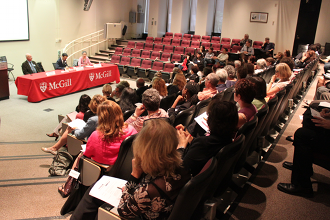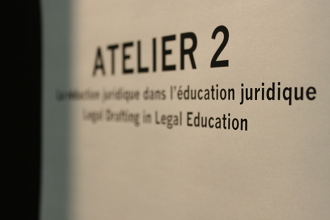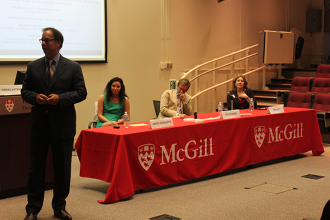
The fifth edition of the Summer Institute of Jurilinguistics was held on 26 August 2011 at the Faculty of Law of McGill University. It was organized by the Quebec Research Centre of Private and Comparative Law (now known as the Paul-André Crépeau Centre for Private and Comparative Law), McGill University, in collaboration with the other members of the Network of Jurilinguistic Centres. The Institute brought together more than a hundred participants drawn from different fields with ties to jurilinguistics.
The scholarly programme for the day was shared amongst two plenary sessions and four workshops. The plenary sessions offered a comparative view of law and language, with equal parts of scholarship and orientation towards practice. The workshops allowed for exchanges in small groups, favouring discussion of the practical factors and the difficulties which are part and parcel of legal translation.

The day opened with words of welcome from Robert Leckey, acting director of the Centre. Then followed the first plenary session, moderated by Prof. Víctor Muñiz-Fraticelli. It concerned Jurilinguistics in the academic realm, providing a more specific view of the positions held in Europe and in Canada on the topic.
First, Prof. Christopher Goddard, from the Riga Graduate School of Law in Latvia, gave a presentation entitled “A Voice in the Wilderness? Legal Linguistics in Search of a Place in the Curriculum”. To listen to Prof. Goddard’s presentation, please click here: Christopher Goddard . Following this contribution, Prof. Aline Grenon, of the Faculty of Law, Common Law Section, University of Ottawa, spoke as a Canadian respondent. The text of Prof. Grenon’s presentation is available by clicking here: La jurilinguistique dans le monde académique - Aline Grenon [pdf] and you can also listen to her presentation by clicking here: Aline Grenon .

There were two workshops in the course of the morning. The first was moderated by Caroline Cassagnabère and concerned the teaching of law in Spanish. Entitled “Teaching Law in Spanish for a Better Understanding: Insights from the Grupo Hispano at the McGill Faculty of Law”, this workshop was presented by Nelcy López Cuéllar, D.C.L. candidate (McGill Faculty of Law). It described the limitations posed by teaching Latin America law in French or in English. To listen to Ms López Cuéllar’s presentation, please click here: Nelcy López Cuéllar . The second workshop was moderated by Prof. Mariève Lacroix of the Faculty of Law, Civil Law Section, University of Ottawa. It concerned teaching the skills of a legal professional in Quebec and was presented by Nadia Chammas, research scholar (QRCPCL). To listen to Ms Chammas’s presentation, please click here: Nadia Chammas .

Two other workshops took place during the afternoon. The first, moderated by France Allard, was presented by Gladys Matthews, a certified court interpreter in the State of Indiana, and concerned legal translation in judicial matters, as well as training for this kind of translation, in the United States. The second workshop, moderated by Prof. Adrian Popovici, was presented by Eve-Marie Préfontaine, Nunavik Justice Officer (Makivik). Mtre Préfontaine addressed the issues and initiatives with respect to justice and language in Nunavik. To listen to Mtre Préfontaine’s presentation, please click here: Eve-Marie Préfontaine .
The last plenary session, moderated by Prof. Helge Dedek, received support from the European Union Centre of Excellence (EUCE). This session was a superb opportunity for sustained inquiry into legal translation in a context of multilingual justice, once again from the optic of European and Canadian perspectives. More specifically, these presentations made it possible to reflect on the impact of the translation of judgements and on the potential of this translation- even in spite of itself- as a force which generates law. First, Prof. Karen McAuliffe, of the University of Exeter, presented with erudition the results of her research on the linguistic dimension of the notion of “precedent” in the decisions and proceedings of the European Court of Justice. To listen to Prof. McAuliffe's presentation, please click here: Karen McAuliffe .  Then Vera Roy, from the Société québécoise d’information juridique (SOQUIJ), explained how this Quebec government agency carries-out unofficial translation of the decisions of Quebec courts and tribunals. While providing concrete examples of the challenges that must be mastered by a legal translator in a bilingual and bijuridical country, Ms Roy brilliantly set out the weight and relevance of these translations, in Quebec and outside this province. To listen to Ms Roy's presentation, please click here: Vera Roy .
Then Vera Roy, from the Société québécoise d’information juridique (SOQUIJ), explained how this Quebec government agency carries-out unofficial translation of the decisions of Quebec courts and tribunals. While providing concrete examples of the challenges that must be mastered by a legal translator in a bilingual and bijuridical country, Ms Roy brilliantly set out the weight and relevance of these translations, in Quebec and outside this province. To listen to Ms Roy's presentation, please click here: Vera Roy .
Finally, the 2011 edition of the Summer Institute of Jurilinguistics closed with the kind words of Prof. Daniel Jutras, dean of the Faculty of Law of McGill University. The fifth Summer Institute was a striking success, a reminder that these institutes remain exemplary as scholarly encounters concerning Jurilinguistics. The organizers, the administrative officers of each of the centres which form the Network of Jurilinguistics Centres, and the participants, all expressed their enthusiastic reaction to this meeting.
Click here to view the program of the 5th Summer Institute of Jurilinguistics: Program - 5th Summer Institute of Jurilinguistics [pdf]
This day was made possible due to the support of Justice Canada, and the QRCPCL extends thanks to the Dean’s Office.
